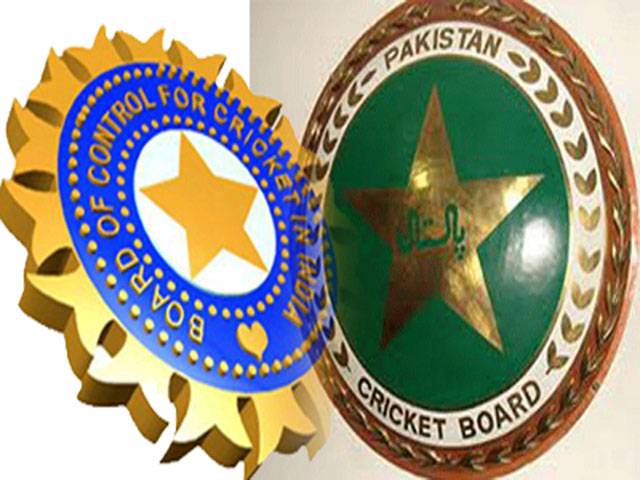ISLAMABAD - Pakistan Cricket Board (PCB) has at last got nod of approval from Prime Minister Mian Nawaz Sharif Nawaz Sharif for clash of titans against arch-rivals Inida at the neutral venue of Sri Lanka.
The two neighbours have been at loggerheads for long amid border skirmishes - blaming each other of firing along the Line of Control and the Working Boundary. The tensions forced cancelation of bilateral meetings.
Prime Ministers Nawaz Sharif and Narendra Modi – who both stayed at the same hotel, only chose to wave at each other in September during the United National General Assembly.
Pakistan also handed evidences of Indian involvement in terrorism-related incidents in Pakistan to the UN and Washington as the confrontation went global. Despite the political tension with India, Prime Minister Nawaz Sharif was always an advocate for a cricket series – himself being an ardent fan of the game.
However, the recent incidents in India where minorities were threatened and Shiv Sena warned India against playing Pakistan, Prime Minister Sharif had no choice but to be cautious. He asked the PCB to wait for his permission regarding cricket with India. A series in India was out of question due to security and when the opportunity arose for a neutral venue, Sharif did not hesitate to seal his consent.
Last month, far-right Hindu group Shiv Sena attacked the Board of Control for Cricket in India (BCCI) headquarters in Mumbai just before PCB chairman Shaharyar Khan was to meet BCCI chief Shashank Manohar to discuss a bilateral series in December.
Earlier, Shiv Sena stopped Pakistan’s Aleem Dar from officiating in an ODI match between India and South Africa in Mumbai. The group also disrupted Ghazal singer Ghulam Ali’s scheduled programme in India and tried to ruin former foreign minister Khurshid Mehmood Kasuri’s book launching in India.
Prime Minister Sharif gave the green signal considering PCB chief Shaharyar Khan’s request seeking permission to play India in Sri Lanka.
A statement from the PM House said, “Given the current security situation, the PCB should hold short series with India at a third location.”
After the Indian government’s approval, it was decided the two sides will play the much-anticipated cricket series in Sri Lanka from December 15. They will play three one-dayers and two Twenty20 internationals. Earlier, two Tests, five one-dayers and two Twenty20 internationals were scheduled between the two arch-rivals from December 15 to January 3.
Pakistan have been playing their home series in the United Arab Emirates (UAE) because of security fears at home, but India was unwilling to send its team to the UAE.
Later, Sri Lanka emerged as a likely solution after crisis talks at the weekend between Shaharyar Khan and BCCI counterpart Shashank Manohar in Dubai failed to end the stalemate.
The meeting was organised by Giles Clarke, who heads the International Cricket Council (ICC) Pakistan task force. Clarke has always been in favour of a series between the sub-continental giants. Both cricket boards had signed a Memorandum of Understanding (MoU) last year to play at least six series from 2015 to 2023, with Pakistan hosting the first one in December. But all series were subject to clearance from their respective governments.
The BCCI was willing to talk about compensating the PCB in case it agreed to play the series in India, but Pakistan rejected the proposal, saying India should honour its commitment. Pakistan also said India had not made any request about sharing revenue.
Pakistan and India have not played a full series since 2007. New Delhi halted all cricket matches with Pakistan following the 2008 attacks in Mumbai, although they did play limited-overs series in 2012. Pakistan-India cricket rivalry is one of the most intense sports rivalries in the world. A Pakistan-India cricket match has been estimated to attract up to one billion viewers, according to TV ratings firms and various other reports.
The players in both teams routinely face intense pressure to win, and are threatened by extreme reactions in defeat. Extreme fan reactions to defeats in key matches such as in the ICC Cricket World Cup have been recorded, with a limited degree of violence and public disturbances.
At the same time, Pakistan-India cricket matches have also offered opportunities for cricket diplomacy as a means to improve relations between the two countries by allowing political leaders to exchange visits and cricket followers from either country to travel to the other to watch the matches.
Hours after PM Sharif allowed the cricket team to play India, Defence Minister Khawaja Asif said Pakistan was fully capable of defending itself from ‘Indian aggression.’
In a statement, he said the extremist mentality with which Prime Minister Narendra Modi soared to great heights, the same mentality has now triggered his fall.
Friday, April 19, 2024
Pakistan-India cricket war goes to Sri Lanka

4:19 PM | April 18, 2024
King Charles's cancer ‘eating him alive,' monarch unable to perform duties: Insider
1:02 AM | April 19, 2024
Mehwish Hayat says she would like to work with Aamir Khan
9:59 PM | April 18, 2024
What caused record-breaking rainfall in UAE?
9:58 PM | April 18, 2024
Donald Trump discusses Ukraine, Middle East, NATO with Polish President Duda
9:57 PM | April 18, 2024
'That'll be awesome,' Rohit Sharma on idea of Pakistan vs India Test series
9:17 PM | April 18, 2024
Hepatitis Challenge
April 18, 2024
IMF Predictions
April 18, 2024
Wheat War
April 18, 2024
Rail Revival
April 17, 2024
Addressing Climate Change
April 17, 2024
Justice denied
April 18, 2024
AI dilemmas unveiled
April 18, 2024
Tax tangle
April 18, 2024
Workforce inequality
April 17, 2024
New partnerships
April 17, 2024
ePaper - Nawaiwaqt
Advertisement
Nawaiwaqt Group | Copyright © 2024





